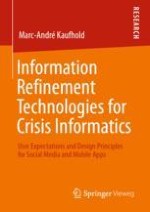2021 | OriginalPaper | Buchkapitel
10. Design and Evaluation of an Active Relevance Classification System
verfasst von : Marc-André Kaufhold
Erschienen in: Information Refinement Technologies for Crisis Informatics
Verlag: Springer Fachmedien Wiesbaden
Aktivieren Sie unsere intelligente Suche, um passende Fachinhalte oder Patente zu finden.
Wählen Sie Textabschnitte aus um mit Künstlicher Intelligenz passenden Patente zu finden. powered by
Markieren Sie Textabschnitte, um KI-gestützt weitere passende Inhalte zu finden. powered by
